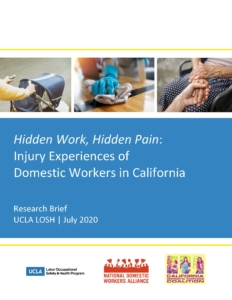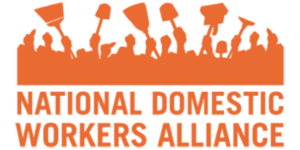Domestic Workers and Day Laborers
Since 2017, The Labor Occupational Safety and Health Program (UCLA LOSH) along with several partners, have conducted research on the experiences of domestic workers and day laborers to improve workplace and safety conditions. View research below:
The Labor Occupational Safety and Health Program (UCLA LOSH), in collaboration with the National Domestic Workers Alliance (NDWA) and the California Domestic Workers Coalition (CDWC) released a new study, Hidden Work, Hidden Pain: Injury Experiences of Domestic Workers in California. The report offers insight into the injuries experienced by the domestic workforce of California, including housekeepers, childcare providers and caregivers and highlights the need for domestic workers to be included under California’s occupational safety and health protections.
Key findings from the report include that fifty-one percent of all respondents said they had experienced pressure from an employer to work in dangerous conditions and an overwhelming majority of respondents (85%) described injuries resulting in chronic back, shoulder, arm, or leg pain. Additionally, more than half of respondents continued to work, despite their chronic pain, out of financial necessity and fear of losing their job.
The report highlights the need for occupational safety and health protections to be extended to residential domestic workers, which could be accomplished through the passage of Senate Bill 1257, the Health and Safety for All Workers Act. The California Domestic Workers Coalition has been urgently pushing for domestic workers to be included in Cal/OSHA, especially now that they are at increased risk of exposure to Covid-19. Senate Bill 1257 was passed through the State Senate in June and is expected to come before the State Assembly Labor Committee on Wednesday, July 29th, 2020.
Report
Key Highlights
- Domestic workers in private homes encountered hazards similar to those found in other healthcare or service-sector jobs.
- The most common type of injury among domestic workers in our sample was musculoskeletal.
- Work-related injuries among residential housecleaners, caregivers, and childcare providers
resulted in substantial costs to workers and their families.
Partners
WORKERS’ COMPENSATION ELIGIBILITY AMONG RESIDENTIAL DAY LABORERS
This brief summarizes research conducted by The Labor Occupational Safety and Health Program (UCLA LOSH) and the National Day Laborer Organizing Network (NDLON) on the experiences of day laborers who are injured while working in residential settings in California. Interviews with 64 day laborers show that 1) workers face a wide range of hazards at residential worksites, 2) the injuries they experience can be serious in nature, and 3) these injuries often result in substantial costs to workers and their families. Many of these workers may be eligible for workers’ compensation when injuries occur, but few injured workers benefit from these resources.
The report includes a discussion of the common barriers day laborers face in accessing workers’ compensation resources, and it consider the impact of proposed legislation in California to streamline workers’ compensation eligibility requirements for this workforce.






